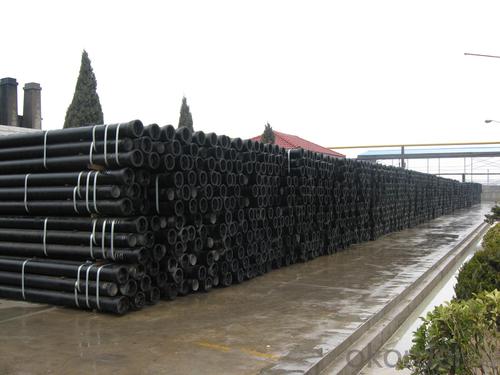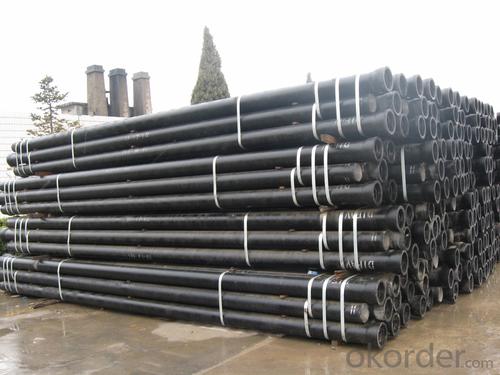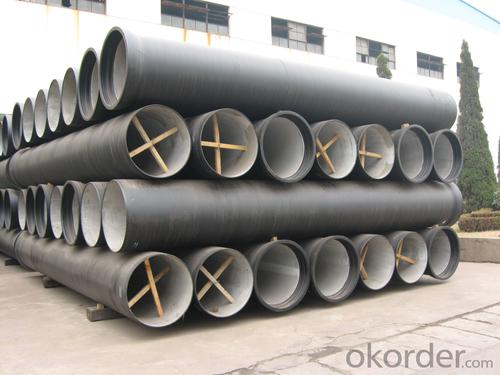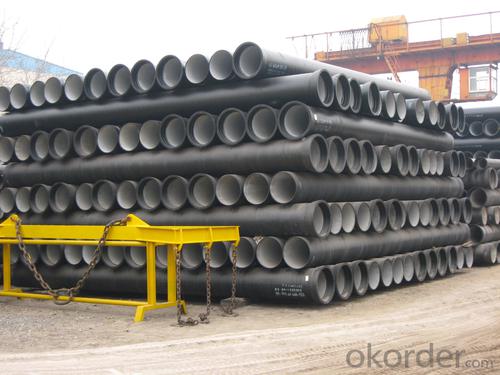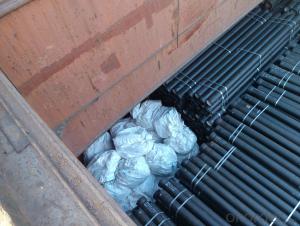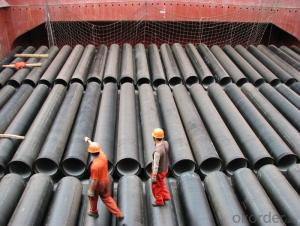DUCTILE IRON PIPE DN800 K8/C/K9
- Loading Port:
- China Main Port
- Payment Terms:
- TT OR LC
- Min Order Qty:
- -
- Supply Capability:
- -
OKorder Service Pledge
OKorder Financial Service
You Might Also Like
Specification:
1) The standard of pipe: ISO2531:1998, K9
2) Effective length: 6m
3) Inner cement line: Portland cement line as per ISO4179
4) Zinc coating: at least 130g/m2 as per ISO8179
5) Bitumen painting: at least 70um as per ISO8179
6) With 100% quantity of NBR ring, or SBR ring, or EPDM ring as per ISO4633
7) DN80mm-800mm
8) High strength, lighter than grey iron, good corrosion resistance, no furring, small flow resistance, easy fixing, long life tome about 100 yeas
9) Produced by Hangzhou chunfeng machine
10) Checked by automatic inspection equipment
11) Composition:
Chemical composition | | | | |||
Chemical composition | Ductile Cast Iron Pipe (%) | Grey iron pipe (%) | Steel pipe (%) | | | |
C | 3.5-4.0 | 3.2-3.8 | 0.1-0.2 | | | |
Si | 1.9-2.6 | 1.4-2.2 | 0.15-0.4 | | | |
Mn | 0.15-0.45 | 0.4-0.6 | 0.3-0.6 | | | |
P | ≤0.06 | ≤0.3 | 0.02-0.03 | | | |
S | ≤0.02 | ≤0.1 | 0.02-0.03 | | | |
Mg | 0.03-0.06 |
|
| | | |
12) Feature:
Mechanical properties | | | | |||
| Ductile Cast Iron Pipe | Grey Iron Pipe | Steel Pipe | | | |
Tensile Strength(Mpa) | ≥420 | 150-260 | ≥400 | | | |
Yield Strength(Mpa) | ≥300 | No Confirmation | No Confirmation | | | |
Bending Strength(Mpa) | ≥590 | 200-360 | ≥400 | | | |
Elongation (%) | ≥10 | Neglected | ≥18 | | | |
Brinell Hardness(HBS) | ≤230 | ≤230 | About 140 | | | |
13) T type mechanical joint
14) Packing: in bulk or container
- Q: Can ductile iron pipes be used for underground steam distribution systems?
- Yes, ductile iron pipes can be used for underground steam distribution systems. Ductile iron is a type of cast iron that has been treated with magnesium to make it more flexible and resistant to cracking. This makes it suitable for use in underground applications where the pipes may need to withstand high pressure and temperature conditions, such as in steam distribution systems. Ductile iron pipes have excellent strength and durability, which makes them capable of handling the extreme conditions associated with steam distribution. Additionally, their corrosion resistance properties make them a reliable choice for long-term use in underground environments. However, it is important to note that proper insulation should be used to prevent heat loss and ensure the efficiency of the steam distribution system.
- Q: Fire water supply network adopts ductile iron pipe, the test pressure should be no more than MPa
- Strictly speaking: the outer pipe network and the internal pipe network are the same. Minimum fire 1.0MPa, minimum sprinkler 1.4MPa. Because not only in accordance with the water pump, but also take into account the pressure on the fire engine.
- Q: Are ductile iron pipes suitable for irrigation systems in agricultural fields?
- Yes, ductile iron pipes are suitable for irrigation systems in agricultural fields. Ductile iron pipes have excellent strength, durability, and corrosion resistance, making them ideal for carrying water in irrigation systems. They can withstand high pressure and heavy loads, ensuring reliable water supply to agricultural fields for irrigation purposes.
- Q: Can ductile iron pipes be used for stormwater management systems?
- Yes, ductile iron pipes can be used for stormwater management systems. Ductile iron pipes are known for their strength, durability, and corrosion resistance, making them suitable for handling stormwater runoff. They can effectively transport large volumes of water and withstand the pressure and impact associated with stormwater management.
- Q: How to control mortar proportioning in ductile iron pipe cement coating
- The mix ratio of cement coated mortar for ductile iron pipes refers to the weight ratio of various raw materials consisting of ductile iron pipes and cement coated mortars.
- Q: What is the expected thrust restraint method for ductile iron pipes?
- The expected thrust restraint method for ductile iron pipes is typically achieved through the use of thrust blocks or restraints, which are designed to counteract the forces generated by the fluid pressure within the pipeline. These blocks or restraints are typically made of concrete or other sturdy materials and are strategically placed at bends, tees, and other locations where changes in direction occur. They help to anchor the pipes and prevent them from moving or being displaced due to the thrust forces.
- Q: Ductile iron pipe is how many years warranty
- In the ferrite and pearlite matrix on the distribution of a certain number of spheroidal graphite, according to the nominal diameter and the elongation of different microstructure of ferrite and pearlite in different proportions of small caliber pearlite percentage is generally not more than 20%, large diameter of the general control in about 25%.
- Q: Why does the cast iron pipe always run off when testing?
- If the pipe is exposed for pressure test, you must add a pier, or else the fittings fly out. You are not surprised. At the same time, the pressure test before the ink tube to make full immersion bubble discharge clean, or a big easy gas pressure pipe explosion.
- Q: How are ductile iron pipes connected or jointed together?
- Ductile iron pipes are typically connected or jointed together using various methods such as flanged joints, push-on joints, mechanical joints, or restrained joints. These methods ensure a secure and leak-free connection between the pipes, providing a reliable and durable pipeline system.
- Q: Can ductile iron pipes be used for water treatment facilities?
- Yes, ductile iron pipes can be used for water treatment facilities. Ductile iron is a type of cast iron that has enhanced strength, flexibility, and durability. These properties make it suitable for use in various applications, including water treatment facilities. Ductile iron pipes have excellent corrosion resistance, which is crucial in water treatment facilities where the pipes come in contact with different chemicals and water contaminants. They can withstand the harsh conditions and chemicals found in water treatment processes, ensuring a long service life. Moreover, ductile iron pipes have high tensile strength and are capable of withstanding high pressure. This makes them suitable for carrying the water throughout the facility, including the distribution system, pumping stations, and treatment units. They can handle the required flow rates and pressures without compromising the integrity of the pipes. In addition, ductile iron pipes are known for their flexibility and resilience. They can withstand ground movement and other external stresses, minimizing the risk of pipe failures and leaks. This is important in water treatment facilities where pipes often pass through different terrains and undergo frequent maintenance activities. Furthermore, ductile iron pipes are cost-effective compared to other alternative pipe materials like steel or PVC. They have a long life span, require minimal maintenance, and have low failure rates, reducing the overall operational and maintenance costs for water treatment facilities. Overall, ductile iron pipes offer a reliable and durable solution for water treatment facilities. Their corrosion resistance, high tensile strength, flexibility, and cost-effectiveness make them a suitable choice for transporting water and chemicals within the facility, ensuring efficient and effective water treatment processes.
Send your message to us
DUCTILE IRON PIPE DN800 K8/C/K9
- Loading Port:
- China Main Port
- Payment Terms:
- TT OR LC
- Min Order Qty:
- -
- Supply Capability:
- -
OKorder Service Pledge
OKorder Financial Service
Similar products
Hot products
Hot Searches
Related keywords




